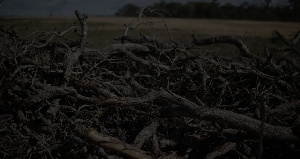 Permissive land-use policies & cheap farm acreage have helped Brazil into an agriculture superpower
Permissive land-use policies & cheap farm acreage have helped Brazil into an agriculture superpower
When farmer Julimar Pansera purchased land in Brazil’s interior seven years ago, it was blanketed in tiers of fruit trees, twisted shrubs and the occasional palm standing tall in a thicket of undergrowth.
He mowed down most of that vegetation, set it ablaze and started planting soybeans. Over the past decade, he and others in the region have deforested an area larger than South Korea.
Permissive land-use policies and cheap farm acreage here have helped catapult Brazil into an agricultural superpower, the world’s largest exporter of soy, beef and chicken and a major producer of pork and corn. This area has also lured farmers and ranchers away from the Amazon jungle, whose decline has spurred a global outcry to protect it.
The tradeoff, environmentalists say, is that while Brazil has slowed destruction of the renowned rainforest from its worst levels, it has put another vital ecological zone at risk: a vast tropical savanna that is home to 5 percent of species on the planet.
Known as the Cerrado, this habitat lost more than 105,000 square kilometers (40,541 square miles) of native cover since 2008, according to government figures. That’s 50 percent more than the deforestation seen during the same period in the Amazon, a biome more than three times larger. Accounting for relative size, the Cerrado is disappearing nearly four times faster than the rainforest.
The largest savanna in South America, the Cerrado is a vital storehouse for carbon dioxide, the greenhouse gas whose rising emissions from fossil fuels and deforestation are warming the world’s atmosphere. Brazilian officials have cited protection of native vegetation as critical to meeting its obligations under the Paris Agreement on climate change. But scientists warn the biome has reached a tipping point that could hamper Brazil’s efforts and worsen global warming.
By focusing on one problem, Brazil essentially created another, said Ane Alencar, science director of the non-profit Amazon Environmental Research Institute, known as IPAM.
“There’s a high risk for the climate associated with this expansion,” Alencar said. “Limiting and calling attention to deforestation in the Amazon, in a way it forced the agribusiness industry to expand in the Cerrado.”
The toll can already be seen in the region’s water resources. Streams and springs are filling with silt and drying up as vegetation around them vanishes. That in turn is weakening the headwaters of vital rivers flowing to the rest of the country, scientists say. The imperiled waterways include the Sao Francisco, Brazil’s longest river outside the Amazon, where water levels are hitting never-before-seen lows in the dry season.
“The removal of vegetation can lead a body of water to extinction,” said Liliana Pena Naval, an environmental engineering professor at the Federal University of Tocantins.
Wildlife, too, is under threat, including rare hyacinth macaws, maned wolves and jaguars that call the shrinking savanna home. So are thousands of plants, fish, insects and other creatures found nowhere else on earth, many of which are only beginning to be studied.
“I compare it to the burning of the ancient Library of Alexandria,” said Mercedes Bustamante, an ecologist at the University of Brasilia. “You lose the accumulated evolutionary record of thousands of years that never can be recovered.”
Farmers see the Cerrado’s development as critical to global food security and their nation’s prosperity. Brazil’s agriculture sector grew a sizzling 13 percent in 2017, while the overall economy barely budged. The nation’s ability to keep producing new farmland cheaply has given it an edge over rivals and cemented its status as a vital supplier to the world’s tables.
“Imagine, if not for Brazil’s production, how much more hunger would there be,” farmer Pansera said.